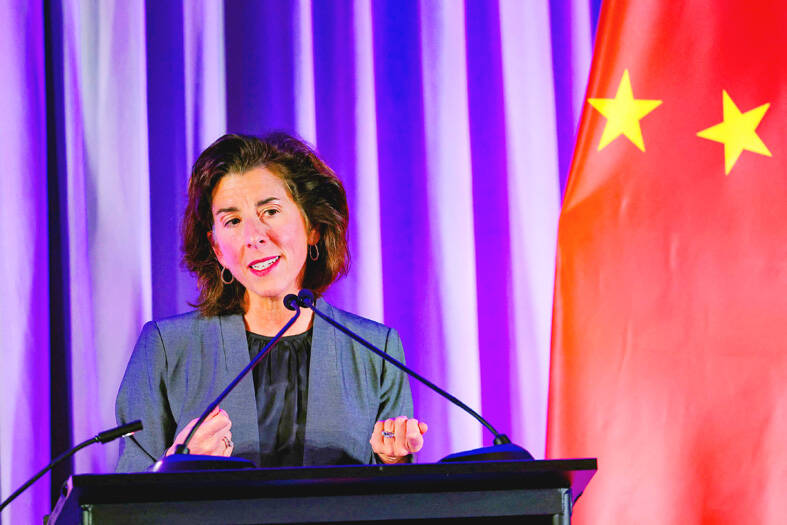US Secretary of Commerce Gina Raimondo on Saturday urged lawmakers, Silicon Valley and US allies to stop China from getting semiconductors and cutting-edge technologies key to national security.
Speaking at an annual national defense forum in Simi Valley, California, Raimondo called Beijing “the biggest threat we’ve ever had” and stressed that “China is not our friend.”
The world’s top two economies are locked in a fierce commercial and geopolitical rivalry, in which her department plays a leading role.

Photo:Reuters
In October, Raimondo unveiled a series of restrictions on the export of advanced chips to China, including those used in the development of artificial intelligence (AI), to prevent their use by Beijing for its military.
“I know there are CEOs of chip companies in this audience who were a little cranky with me when I did that, because you’re losing revenue. Such is life, protecting our national security matters more than short-term revenue,” she said.
“Newsflash: Democracy is good for your businesses. Rule of law here and around the world is good for your businesses,” she said.
Raimondo said that Nvidia Corp, maker of the most sophisticated chips needed to develop the latest generation of AI, had developed a product that performs just below the limit set by her department for export to China.
“That’s what industry does,” she said. “That’s not productive.”
“Every day China wakes up trying to figure out how to do an end run around our export controls ... which means every minute of every day, we have to wake up tightening those controls and being more serious about enforcement with our allies,” she said.
Separately, the US government proposed new rules on Friday regarding its electric vehicle (EV) subsidies, setting limits on material that producers can source from China or other rival countries.
The guidelines spell out how EVs could qualify for a tax credit of up to US$7,500 under US President Joe Biden’s landmark climate action plan, the Inflation Reduction Act.
They come as Washington works to reduce its burgeoning electric car industry’s reliance on China. Currently, the key EV industry is dominated by China.
Under the latest proposal released by the US Department of Treasury, an eligible clean vehicle cannot contain battery components made or assembled by a “foreign entity of concern” starting next year.
From 2025, a qualifying vehicle also cannot contain critical minerals extracted, processed or recycled by such entities.
This targets companies owned by, or subject to the jurisdiction of countries like China, Russia, North Korea and Iran. They would be barred from providing such materials to vehicles aiming to qualify for tax breaks.
A firm could be considered a foreign entity of concern if it were incorporated in one of these countries, or if it hit a 25 percent ownership threshold.
The latest rules would likely reduce the number of vehicles eligible for tax credits while piling pressure on automakers as they grapple with the transition to producing electric cars.

UNCERTAINTY: Innolux activated a stringent supply chain management mechanism, as it did during the COVID-19 pandemic, to ensure optimal inventory levels for customers Flat-panel display makers AUO Corp (友達) and Innolux Corp (群創) yesterday said that about 12 to 20 percent of their display business is at risk of potential US tariffs and that they would relocate production or shipment destinations to mitigate the levies’ effects. US tariffs would have a direct impact of US$200 million on AUO’s revenue, company chairman Paul Peng (彭雙浪) told reporters on the sidelines of the Touch Taiwan trade show in Taipei yesterday. That would make up about 12 percent of the company’s overall revenue. To cope with the tariff uncertainty, AUO plans to allocate its production to manufacturing facilities in

TAKING STOCK: A Taiwanese cookware firm in Vietnam urged customers to assess inventory or place orders early so shipments can reach the US while tariffs are paused Taiwanese businesses in Vietnam are exploring alternatives after the White House imposed a 46 percent import duty on Vietnamese goods, following US President Donald Trump’s announcement of “reciprocal” tariffs on the US’ trading partners. Lo Shih-liang (羅世良), chairman of Brico Industry Co (裕茂工業), a Taiwanese company that manufactures cast iron cookware and stove components in Vietnam, said that more than 40 percent of his business was tied to the US market, describing the constant US policy shifts as an emotional roller coaster. “I work during the day and stay up all night watching the news. I’ve been following US news until 3am

Taiwan will prioritize the development of silicon photonics by taking advantage of its strength in the semiconductor industry to build another shield to protect the local economy, National Development Council (NDC) Minister Paul Liu (劉鏡清) said yesterday. Speaking at a meeting of the legislature’s Economics Committee, Liu said Taiwan already has the artificial intelligence (AI) industry as a shield, after the semiconductor industry, to safeguard the country, and is looking at new unique fields to build more economic shields. While Taiwan will further strengthen its existing shields, over the longer term, the country is determined to focus on such potential segments as

COLLABORATION: Given Taiwan’s key position in global supply chains, the US firm is discussing strategies with local partners and clients to deal with global uncertainties Advanced Micro Devices Inc (AMD) yesterday said it is meeting with local ecosystem partners, including Taiwan Semiconductor Manufacturing Co (TSMC, 台積電), to discuss strategies, including long-term manufacturing, to navigate uncertainties such as US tariffs, as Taiwan occupies an important position in global supply chains. AMD chief executive officer Lisa Su (蘇姿丰) told reporters that Taiwan is an important part of the chip designer’s ecosystem and she is discussing with partners and customers in Taiwan to forge strong collaborations on different areas during this critical period. AMD has just become the first artificial-intelligence (AI) server chip customer of TSMC to utilize its advanced